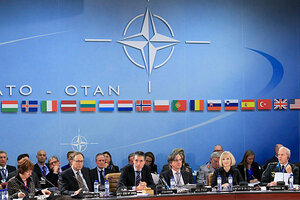Syria chemical weapons scare: Is Assad threatening to use them, or lose them?
A report suggests that Syria has ramped up activity at chemical-weapons sites. But President Bashar al-Assad might simply be sending a message to the international community.

NATO foreign ministers meet at the alliance's headquarters in Brussels Tuesday, when they agreed to send Patriot missiles to beef up Turkey's air defenses and calm Turkey's fears that it could come under missile attack, possibly with chemical weapons, from Syria.
Yves Herman/Reuters
Washington
The spike in concern over Syria’s stockpile of chemical weapons stems in part from worries that an increasingly desperate President Bashar al-Assad might use them against advancing rebel forces in the country’s 21-month-old civil war.
But Mr. Assad also might be sending a different signal to the US and the international community, analysts say. By ordering “activity” at chemical weapons sites, Assad could be reminding the international powers demanding his departure that his fall would likely be followed by chaos – in which radical Islamists could get their hands on Syria’s weapons of mass destruction.
“By far the greater threat is that the state collapses, with the threat of terrorists getting their hands on these weapons,” says Charles Blair, an expert at the Federation of American Scientists (FAS) in Washington.
US officials claim that the Syrian military has gone as far as loading precursor chemicals for the nerve gas sarin into bombs, NBC News reported Thursday. Their use would have serious consequences for the Assad regime. President Obama repeated this week that any use of the weapons by Syria is a red line for the United States.
The fate of Syria's stockpile of chemical weapons is something that concerns the US. Earlier this year, a Pentagon report concluded that it would take 70,000 troops to find and secure Syria's known stockpiles, Mr. Blair notes.
Publicly, Syrian officials maintain that the Assad regime would never use chemical weapons against the Syrian people. On Thursday, one member of the regime, Deputy Foreign Minister Faisal Maqdad, told Lebanese television that “the United States and some European States” were fabricating the chemical-weapons scare to create a “pretext” for intervention in the conflict.
US officials have to consider all the possible motivations behind Assad’s actions, military experts say. But some are confident the US would act preemptively if it was convinced that Assad was on the verge of launching a chemical attack.
“If [the US] had knowledge of them loading these weapons onto planes, they’d go in and take them out right away, I’d expect to see that,” says Lawrence Korb, a defense analyst at the Center for American Progress in Washington. “The problem is that you’d have to have very good intelligence on where to go to get them.”
But Blair says he can envision a range of ways the US might respond to a chemical attack.
The “fast route,” he says, would be to launch a “punitive” strike in retaliation and to try to take out Assad. The “longer route,” he adds, might be to return to the United Nations Security Council to get support for international intervention – support Russia and China have denied so far.
“There’s such a taboo against chemical-weapons use that you’d have to assume that Russia and China would no longer block UN action,” he says.
Another question is what the international community would do to aid the victims of an attack. Blair says treatment does exist for the effects of some of the chemical agents Syria is thought to possess – depending on the severity of the impact. But nobody knows for sure that Syria has chemical weapons, or exactly what they have if they do possess them, he says.
The most treatable victims would be those that had quick access to international assistance – in other words, the victims of an attack near one of Syria’s borders. But Blair adds that such a step would almost certainly lead to outside intervention, starting with the country – for example, Turkey – whose border was affected by the attack.
Still, Blair is far from convinced that Assad would ever use the weapons – saying that doing so would be “suicidal,” something Syrian officials acknowledge.
Assad may be up to something else altogether, Mr. Korb says: “He might be using this as a bargaining chip to win himself free passage out of the country.”

